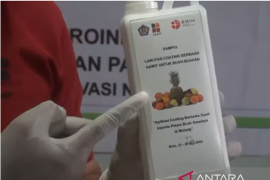In the decree, strategic commodities comprise rice, corn, soybeans, sugar, onions, poultry eggs, ruminant or high-quality protein meat, poultry meat, and chili.
The public may question, what are the considerations for chili and onions to be determined as strategic commodities? Is it because the two can trigger inflation?
Chair of the Commission for Horticultural Development of the Chamber of Commerce and Industry (Kadin), Karen Tambayong, stated that the economic factor remains the key to determine strategic commodities since 1967 despite changing food patterns and demands.
At a gathering held by the Indonesian Horticulture Association (Perhorti) on Saturday (January 6), Tambayong explained that apart from the economic factors, health factors are also taken into account in listing strategic commodities.
She remarked that cases of stunting in Indonesia are still high, especially in some provinces, such as East Nusa Tenggara and West Sulawesi, where the prevalence of stunting reaches over 30 percent.
According to the Statistics Indonesia (BPS) offices in the two provinces, stunting cases reached 35.5 percent and 35 percent respectively.
The strategic food commodities' determination is not only based on economic aspects but also the national health condition.
Indonesia can export these important commodities but the domestic needs may not be fulfilled optimally, so no great leaders will be born due to lackluster health conditions.
Hence, the target of export for economic benefits and domestic demands' fulfillment must be balanced, and public education and government's assistance on healthy food should be prioritized.
Healthy strategic food, with high level of nutrients, can be incorporated in the efforts to prevent or handle stunting, especially in the first one thousand days of life of infants.
Stunting in the first one thousand days of life poses risks that can inhibit physical growth and trigger a child's susceptibility to diseases.
In addition, stunting negatively impacts children's cognitive development, intelligence, and productivity, as quoted from the Vice Presidential Secretariat and the Coordinating Ministry for Human Development and Culture in 2019.
Moreover, a high intake of carbohydrates, reaching 128 kg per capita per year, by members of the Indonesian population contributes to stunting prevalence.
Hence, to this end, massive action to conduct food diversification is deemed necessary.
On the other hand, protein consumption is higher than the target of 57 kg per capita per year, reaching 62 kg per capita per year.
Meanwhile, the national consumption of fruits and vegetables, part of horticultural commodities, only reaches 237 grams per capita per day, below the target of 286 grams per capita per day.
People need to realize the importance of a healthy diet by reducing the intake of carbohydrates and consuming more fruits and vegetables.
Hence, researchers ought to conduct extensive research on food diversification and carry out protein mapping due to the wide territory of the archipelago.
To this end, researchers can make a local food-based map, which is essential, as consumption pattern in Sumatra Island in western Indonesia differs from that of the eastern Indonesia regions.
As a "mega-biodiversity country," Indonesia has an abundance of tropical fruits and vegetables, so it does not need to import most of its fruit and vegetable commodities to meet its needs, such as oranges, melinjo leaves, and spinach.
The development of horticulture in Indonesia does not mean not providing opportunities for imported seeds, but it is important to develop local commodities.
A restriction on importing vegetables can be considered, as it is better to grow vegetables in Indonesia than to import carrots from Australia.
Indonesia must utilize quality seeds obtained from abroad to increase its domestic production and to strengthen local food systems. Collaboration is paramount to the advancement of horticulture.
Research collaboration
The same point was highlighted by Chair of Perhorti, Dewi Sukma, during the inauguration of the Perhorti central board for the 2024-2027 period.
Sukma said, universities and the private sector should establish collaboration in order to produce technology needed by the community in conducting food diversification.
Currently, she said, the researchers are not yet connected with the industry. In addition, government support is of utmost importance.
According to professor of Bogor Agricultural University (IPB University), Prof. Anas D Susila, there needs to be a common understanding of the definition and philosophy of horticulture for all horticulture stakeholders.
Perhorti conducts a road show to all its regional commissariats to equalize the perception that "horticulture provides food for body and soul."
The government, through the Ministry of Industry, has released the "Making Indonesia 4.0" roadmap in 2018 as a strategy that involves various stakeholders, such as the government, industry associations, business actors, technology providers, research institutions, and the education sector.
The principle of Making Indonesia 4.0 must be the foundation for quick actions to achieve long-term goals of every priority sector, including economic growth.
There is a need to accelerate the implementation of the roadmap through various efforts.
*) The author is a lecturer in Communication Studies at Pakuan University and the Third Chairman of the Indonesian Horticulture Association.
The views and opinions expressed on this page are those of the author and do not necessarily reflect the official policy or position of ANTARA News Agency.
Translator: Dr. Sardi Duryatmo, M.Si.*)
Editor: Azis Kurmala
Copyright © ANTARA 2024











